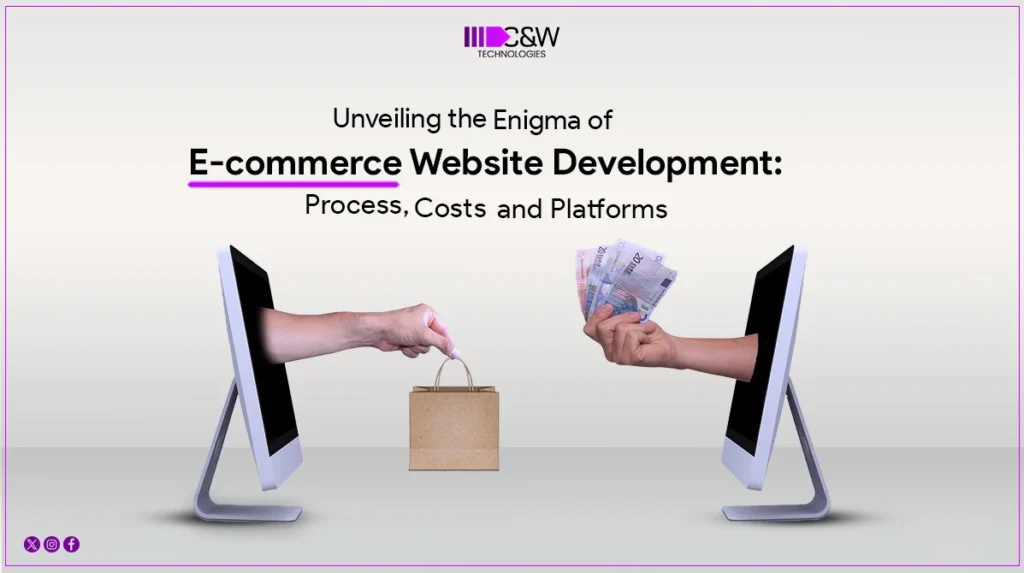Company
Get In Touch
- Plaza 82, Wallayat Complex, Phase 07 Bahria Town, Rawalpindi, Pakistan
- info@cnwtechsolutions.com
- +92 317-5106623

In today’s digital era, establishing a strong e-commerce presence is essential for businesses striving to excel in the competitive market landscape. With the exponential growth of online shopping, the demand for e-commerce websites has soared significantly. However, for those delving into the realm of e-commerce website development, navigating through the plethora of options and comprehending the intricacies of the process can be overwhelming. Fear not, as this comprehensive blog aims to illuminate the fundamentals of e-commerce website development, encompassing costs, processes, platforms, features, and learning avenues.
E-commerce website development entails a multifaceted journey comprising several stages, each vital for crafting a successful online storefront:
This preliminary stage involves delineating the project scope, identifying the target audience, setting objectives, and delineating the requisite features and functionalities essential for the e-commerce website’s success.
Design plays a pivotal role in captivating and engaging users. During this phase, designers craft wireframes, mockups, and visual elements aligned with the brand identity and user experience objectives.
Developers breathe life into the design by coding the front and back end of the e-commerce website. They seamlessly integrate crucial elements such as payment gateways, shopping carts, inventory management systems, and other essential features.
Quality assurance is paramount to ensure a seamless user experience. Rigorous testing is conducted to identify and rectify bugs, optimize performance, and ensure compatibility across diverse devices and browsers.
Upon successful testing, the website is deployed to the production environment, making it accessible to users.
The cost of e-commerce website development is variable, contingent upon numerous factors such as project scope, complexity, features, design intricacy, and development hours. Generally, three primary cost components are considered:
This encompasses expenses associated with crafting the website layout, user interface, and backend development. Costs can range from a few thousand to tens of thousands of dollars, depending on customization requirements and intricacy.
Integration of third-party tools and services, such as payment gateways, shipping providers, and analytics platforms, may incur additional costs.
Ongoing maintenance, updates, and support services are indispensable to ensure the seamless functioning of the e-commerce website. Budgeting for these recurring expenses is imperative for sustained success.
Selecting the most suitable platform is pivotal for the success of an e-commerce venture. Several platforms are renowned for their efficacy:
Recognized for its user-friendly interface and extensive app marketplace, Shopify is an optimal choice for small to medium-sized businesses.
Leveraging the power of WordPress, WooCommerce offers unparalleled flexibility, scalability, and a plethora of customization options, catering to businesses of all sizes.
With robust features and scalability, Magento is favored by large enterprises and businesses with intricate e-commerce requirements.
Offering advanced e-commerce functionalities such as multi-channel selling and enterprise-grade security, BigCommerce is ideal for burgeoning businesses.
Key features integral to e-commerce website development encompass:
Ensuring seamless optimization for mobile devices to accommodate the burgeoning population of mobile shoppers.
Intuitive navigation and search functionality to facilitate users in swiftly finding desired products.
Integration with secure payment gateways to facilitate smooth and secure transactions, instilling trust among users.
Tools facilitating efficient inventory management, tracking stock levels, and automating reorder processes.
Implementation of SEO best practices to enhance visibility and drive organic traffic to the website, thereby augmenting sales potential.
Learning e-commerce website development is an invaluable pursuit in today’s digital landscape. It equips individuals with the knowledge and skills needed to create robust online platforms for selling products and services. From understanding user experience principles to mastering essential coding languages, embarking on the journey of learning e-commerce website development opens doors to endless opportunities in the booming world of online commerce.
E-commerce website development unfolds as a dynamic and gratifying journey necessitating meticulous planning, strategic decision-making, and perpetual learning. By comprehending the process, costs, platforms, features, and available learning avenues, businesses can embark on their e-commerce voyage with confidence, positioning themselves for triumph in the digital marketplace.
2024 © C&W Technologies. All rights reserved.